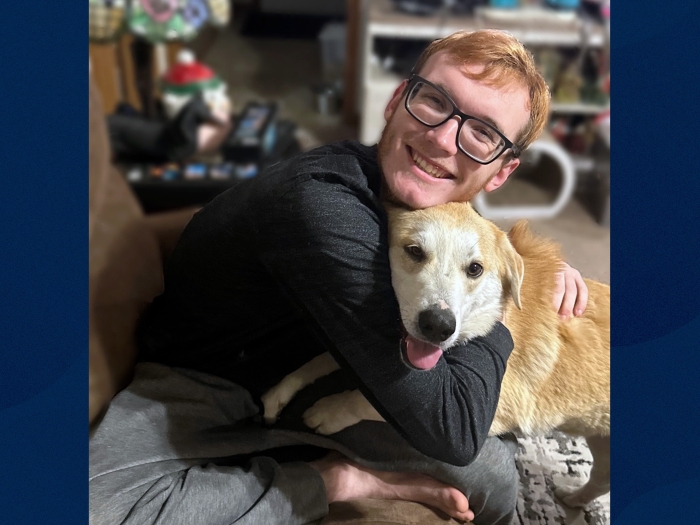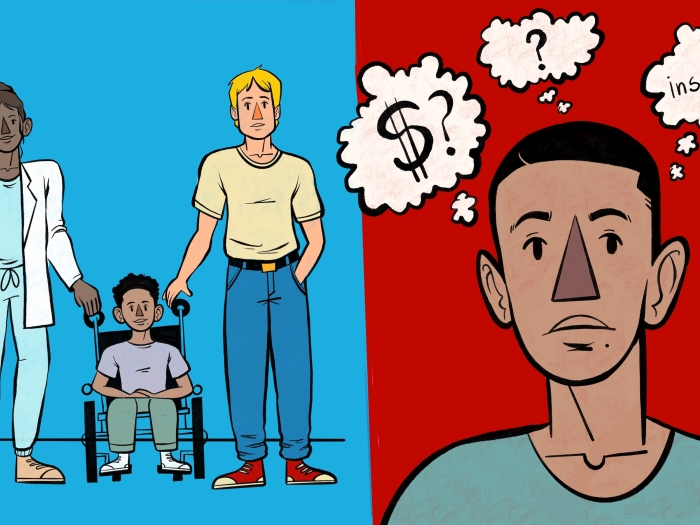Dementia occurs for a variety of reasons — one of which is Alzheimer’s disease. Learn more about the nuances.
7:00 AM
Author |

This article was updated on March 30, 2023.
The difference between Alzheimer's disease and dementia is one of the most common questions received at the Michigan Alzheimer's Disease Center.
It's a great question because the terms are often used in place of each other, even though they mean different things.
In brief, dementia is a broad term used to describe a collection of symptoms. Changes in brain function cause the symptoms, which are severe enough to affect daily functioning. There are many reasons why someone might have dementia. Alzheimer's disease accounts for approximately 75 percent of dementia cases, which is why the words are often used interchangeably.
Picturing the difference
Consider the following visual images:
- Imagine that the fruit bowl in your kitchen is dementia. While there are several different pieces of fruit in the bowl, the fruit found most frequently, perhaps a banana, is Alzheimer's disease. The other fruits in the bowl represent other causes of dementia that aren't as common, such as vascular dementia, Lewy body dementia, frontotemporal dementia or reversible dementias induced by conditions such as a severe urinary tract infection or a vitamin deficiency.
- Imagine that a child has a runny nose. A runny nose is not a specific disease or condition; it is just a symptom. There are many potential reasons for the runny nose. It might be caused by influenza, a sinus infection or a reaction to being outside in the cold for too long. In the same way, dementia is not a specific disease, and there are several reasons a person may exhibit dementia, the most common of which is Alzheimer's disease.
Dementia symptoms
Different forms of dementia have different early symptoms. But common early signs across many types include:
- Forgetfulness (short-term/recent memory loss)
- Decreased concentration and attention span
- Less motivation and lack of initiative
- Difficulty with reasoning and/or abstract thinking
- Disorientation and/or decreased spatial awareness
- Some difficulty with word finding
- Judgment lapses
- Mood changes (depression and/or anxiety)
Dementia progression
Across many forms, the disease typically begins subtly and often exhibits a gradual progression that may include:
SEE ALSO: 5 Ways to Protect Your Memory from Dementia
- A compromised ability to perform complex tasks. This includes taking initiative, concentrating, sequencing and multitasking.
- Short-term memory loss, such as forgetting common words, names or locations of familiar places and items used on a daily basis.
- In later stages, activities of daily living such as bathing, dressing and eating become more difficult. Later stages might also include changes in language and personality.
In addition to the symptoms and progression noted above, there are other symptoms that help physicians specify which type of dementia someone has.
For example, someone with Lewy body dementia might experience visual hallucinations, stiffness and slowness of movement, tremors or night terrors, including acting out dreams. Someone with frontotemporal dementia might express inappropriate social or sexual behavior and more personality, behavior and speech problems than someone with Alzheimer's disease.
Differing diagnoses
Although it has long been the case that there was no test available to confirm the presence of Alzheimer's or other types of dementia, research has advanced in recent years. Positron emission tomography, or a PET scan, is now available to detect beta-amyloid protein during life. Researchers are also currently working to develop a blood test that could detect Alzheimer’s disease long before symptoms emerge.
If you are concerned you are experiencing signs of dementia, it is important to get an evaluation. Your symptoms may have a reversible cause such as an infection, a vitamin deficiency or untreated anxiety or depression. If you have a neurodegenerative disease such as Alzheimer's disease, early identification allows for the best possible intervention and treatment, clinical study participation, social support and future planning.
Important components of a complete dementia evaluation include:
- Symptom review
- Medical and family history
- Physical exam
- Cognitive screening
- Depression evaluation
- Laboratory tests (blood work)
- Brain imaging
- Neuropsychological testing
The University of Michigan Cognitive Disorders Program is one specialty clinic that offers comprehensive evaluations. The program is a division of the Department of Neurology and is located at the U-M Health and Geriatrics Center.
Visit the Michigan Alzheimer's Disease Center website to learn more about memory, Alzheimer's disease and dementia. To schedule an appointment at the U-M Cognitive Disorders clinic, call 734-764-6831. Ask your primary care physician for a referral.

Explore a variety of health care news & stories by visiting the Health Lab home page for more articles.

Department of Communication at Michigan Medicine
Want top health & research news weekly? Sign up for Health Lab’s newsletters today!





